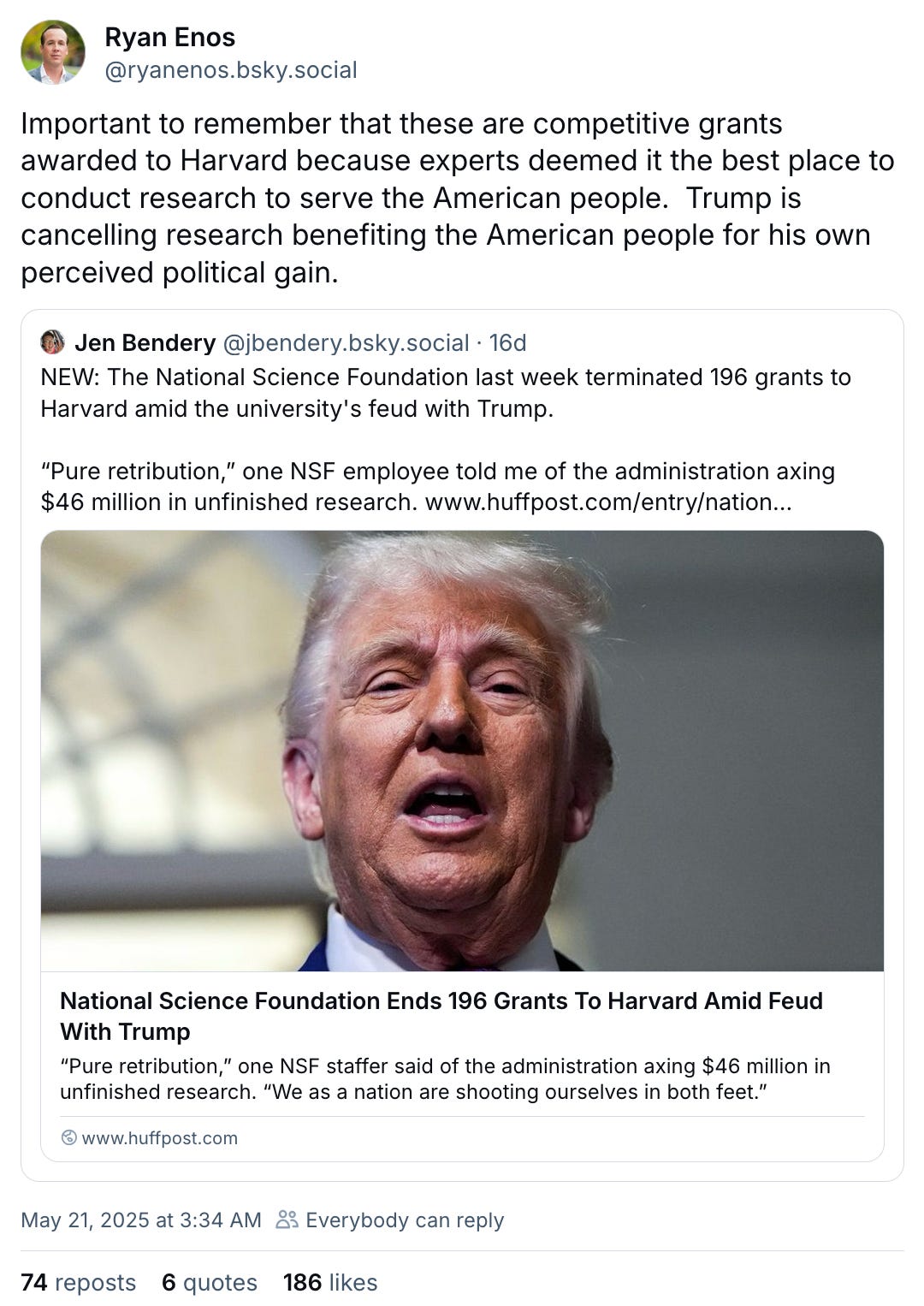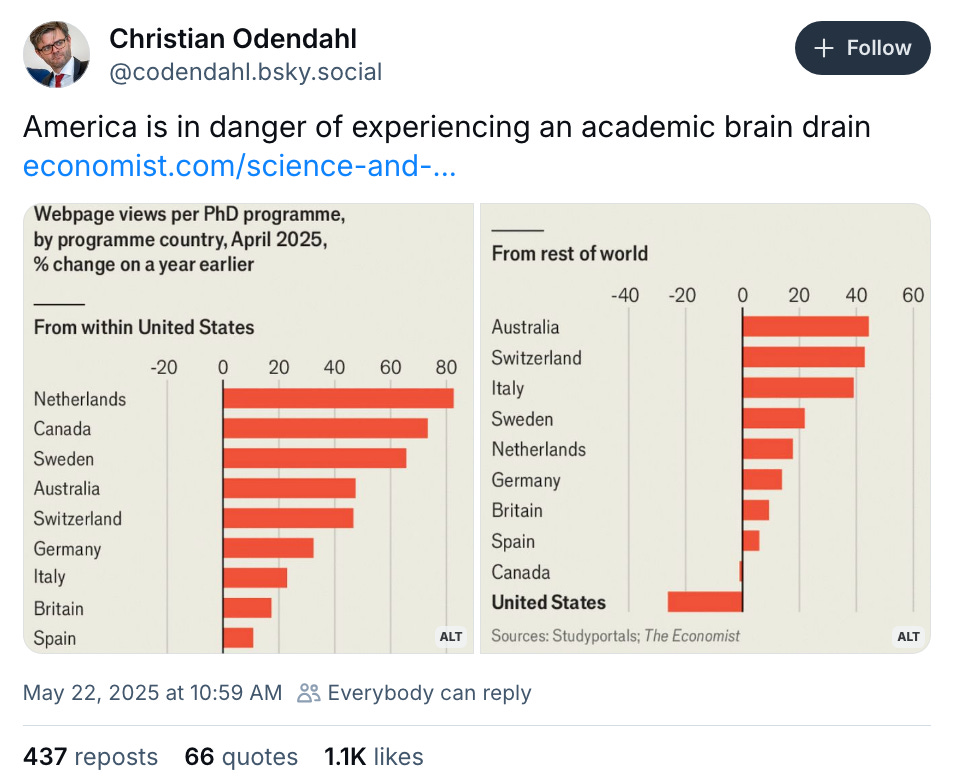In this episode of Talking About the Future, I talk with Harvard Professor of Government Ryan Enos about the Trump administration’s attacks on Harvard University. In March, Enos and fellow Harvard Government Professor Steven Levitsky called for Harvard to “take a stand for democracy.” The Trump administration has since imposed a range of extraordinary sanctions against Harvard, ostensibly on the grounds that Harvard has failed to maintain “a campus environment free from violence and anti-Semitism.” You can listen to our full conversation using the audio player above or on most podcast platforms. You can follow Ryan Enos on Substack here and on Bluesky here. Excerpts from our conversation, edited for clarity, are below. If you enjoy this conversation, please share it with others.
Is Harvard a violent campus? Why is Harvard being singled out?
RE: It's certainly not because it's violent. It's a remarkable disconnect between the rhetoric you hear from the president and his administration and what you'd experience if you're on campus every day. This is almost to the point where it's hard for me to talk about because when somebody says something that's so disconnected from reality, you almost don't know how to respond to it. So often I tell people to come to campus and see it with your own eyes. I know most people can't do it, but I think that would be useful to people because what's been expressed by the Trump administration is that the campus is this place that is overrun with antisemitism. and violence, and harassment of certain types of people, and so on and so on. And none of that fits with the day-to-day reality. In fact, none of it really fits with the anecdotal reality either. There's just no recorded cases of people being violently attacked or things like that. So what is this all about? Well, I think the way to describe the accusations of antisemitism is that it's a pretext for something that the president wanted to do, which was to attack higher education in the United States. And, unfortunately, that fits a pattern of attacks on higher education by authoritarian leaders in other places, in other countries where democracy has been dismantled. So it's part of a pattern of behavior that fits with authoritarian dismantling of civil society.
This is actually similar in some ways to what Viktor Orban did in Hungary—Viktor Orban, who has kind of become a model for the MAGA movement and has spoken at CPAC, I think—and Central European University more or less picked up and moved to Vienna in order to avoid his attacks. What is the value to someone like Trump of attacking an institution like Harvard?
RE: If we think about it in terms of authoritarians—we'll speak generally about that and then more specifically about Trump and American politics in particular here in a moment—it's not just Orban. Of course, we saw this in Turkey where universities were purged of professors. This happened in Venezuela, as well. I think Turkey is a particularly useful example because, of course, that was a longstanding democracy in the way the United States is and can really serve as a warning where we can see a longstanding democracy slip away. It existed for about 90 years before Erdoğan started to take it apart and make it into a system of competitive authoritarianism, and he attacked universities as well. The reason authoritarians seem to want to do that is because universities are places that encourage things that authoritarians don't like, like criticism of the government, because they're places of free thought and dissent. Authoritarians don't like that. They don't like people disagreeing with them. They don't like people encouraging things like protests. Universities tend to have a lot of protests for various reasons. They don't like encouraging people to write critical op-eds. Universities generate a lot of those things. Those are all things that authoritarian leaders don't like. That's why it was so predictable that Donald Trump was going to do this....
The Trump administration issued this letter on a Friday night—which they then said was a mistake and that Harvard should have known it was a mistake, even though it was signed by three high-level officials. It really is a remarkable letter. It wanted final approval of the administration's hiring and admissions process. It wanted to restructure or eliminate some of Harvard's major departments, including the Medical School, the School of Public Health, Harvard Law School, the International Human Rights Clinic—a whole list of them. And then it wanted to audit the viewpoints of students, faculty, and staff for “viewpoint diversity.” So at that point, it seems like if Harvard didn't say no, it was the end of Harvard as an independent institution.
RE: I think you're right. I mean, it was just such an overreach by the Trump administration. I think, to put a finer point on it, it really wouldn't have been just an end to Harvard as an independent institution, it would have been a radical break with the tradition of American higher education. There’s just never been a situation where we have said, the government is going to audit—and “audit” is too kind of a word, because what they meant was that they were going to force certain viewpoints onto a campus, reach into a private institution in the United States and say, “we're going to force political viewpoints onto your staff.” It would have been a radical break with the American tradition of higher education and arguably with the relationship between the government and the citizenry. For Harvard to be the conduit for that would have been an incredible thing to behold. I don't know if the people who govern Harvard could have gone to bed at night and lived with themselves knowing that they were the ones who facilitated that. So, in a certain respect, the Trump administration made it easy for us....
So what can we do to protect independent institutions like Harvard, but also law firms, independent media, all these institutions that represent independent sources of power that could push back against government overreach?
RE: I think that's the right question, Robert, because it is beyond just Harvard. This is the case I've been making because I've talked to people a lot about this. There are good reasons that people don't care about Harvard. And it's not just about Harvard. It's about the independence of institutions in the United States and their ability to be places that can disagree with the government and can defy the president, and that's the way things should be in the United States. So it's not just a story of Harvard. And you're asking exactly the right question, which is what can institutions do more generally, right? This is difficult because one of the problems—and this is what higher education has faced, I think, and these law firms have faced and these media companies have faced—is that it is a collective action problem....
What I think needs to happen to avoid the situation when one person—I'm very proud that Harvard's doing this, but it's not sustainable in the long run for one institution to stand up—is I think there does need to be sort of a mutual agreement that places stand up together. I think law firms can do this. I think they can publicly announce—universities can publicly announce—that they are not going to comply. Media organizations could do this. It's easy for media organizations because it's part of their ethical code in many ways, right? The code of journalism is a belief in freedom of the press and not being controlled by government censorship. So they could publicly state their values around this. What you can say is that we are going to essentially come together in mutual defense and hold each other accountable for standing up....
What should the Democratic Party do? The Democrats have seemed very feckless, unable to get much done. Their strategy seems often to be, let's just let the Trump administration shoot itself in the foot, let's talk about the price of eggs because that's what polls well. It doesn't seem like they're doing much as a party to shape the message. What would your advice be to the Democratic Party to change the conversation?
RE: Yeah, so that's a really good question. That's exactly why I brought up that book [The Nature and Origins of Mass Opinion by John R. Zaller]. I think for whatever reason—and I don't know why this is—politicians underestimate their own ability to shape public opinion. I don't know what the psychology behind that is. I don't know if it's because they think they're servants of the people and they got elected because they're popular, not because they're convincing people that they're popular. But Democratic politicians will say things like, “we can't talk about Trump being an authoritarian because people want to hear about egg prices.” What they're discounting is that the public doesn't know what to think about authoritarianism until their leaders tell them. One of the central models of that book is that elites drive public opinion. I often say modern political science has been around for 70 years or so. We don't know a lot of things for sure, but I think we kind of know this. The evidence is pretty strong that elites shape public opinion....
The short answer is I do think that Democrats really can lean into this message that Donald Trump is a threat to the American system and he's abusing the American system of democracy. I think voters are largely responsive to that. The one thing that voters love—if you had to put everything out there that Americans revere—the number one thing is the American Constitution. There's almost nothing that Americans revere more. The message that Donald Trump is a threat to the American Constitution I think resonates with a lot of people.
The books Ryan Enos recommends in this conversation as useful in understanding American politics right now are John R. Zaller, The Nature and Origins of Mass Opinion; Irving L. Janis, Groupthink; and Jim Sidanius and Felicia Pratto, Social Dominance. My earlier interview with University of Toronto political scientist Lucan Way on the US turn to competitive authoritarianism is here. I can’t continue to do this without reader support, so if you enjoyed this conversation, please consider becoming a paid subscriber to Telling the Future.














Share this post